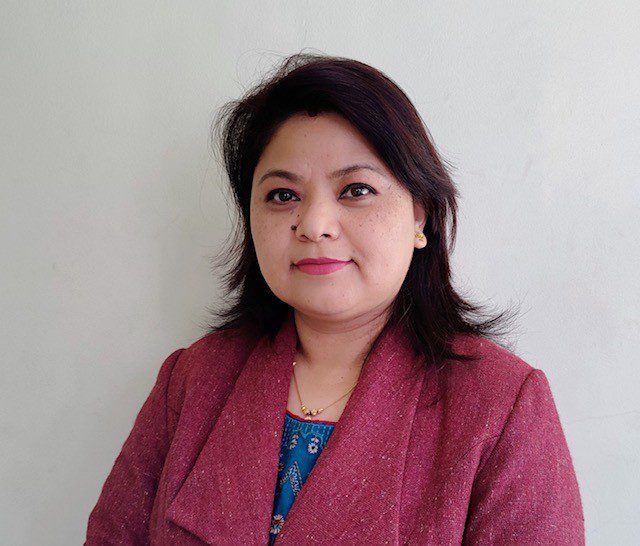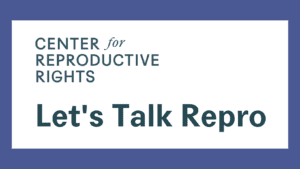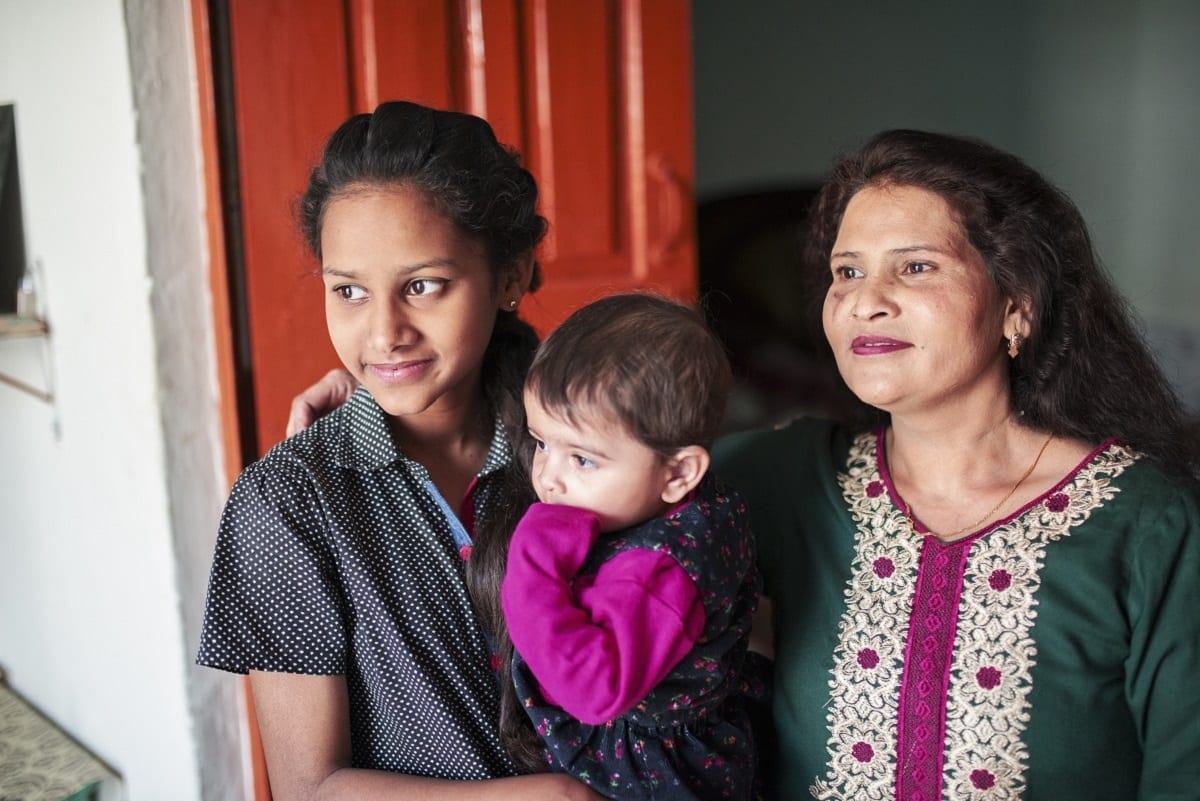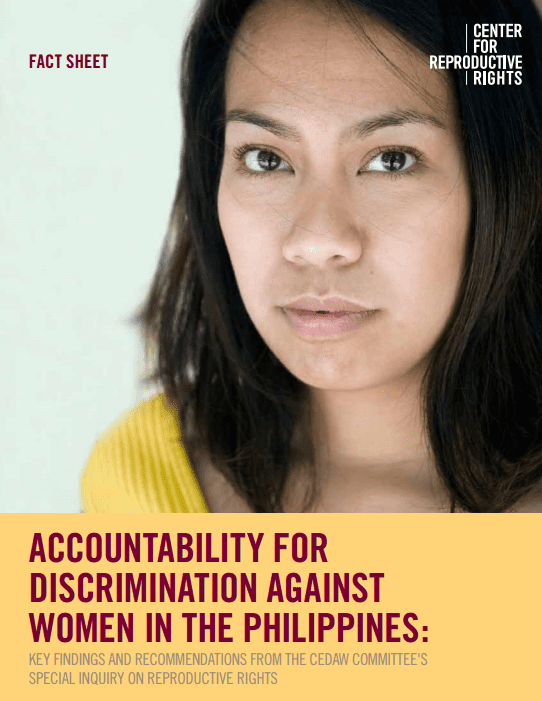“Let’s Talk Repro” Series: Prabina Bajracharya, Senior Manager for Asia
"I see reproductive rights as being at the core of gender equality and human rights, and this really resonates with the Center's mission."
“Let’s Talk Repro” is a new series highlighting Center professionals and their work. This is the third article in the series.
Name: Prabina Bajracharya
Title: Senior Manager for Asia
Pronouns: She/her
Years at the Center: 6

Prabina Bajracharya, Senior Manager for Asia at the Center for Reproductive Rights, provides strategic guidance to the Asia Unit in advancing laws and standards on reproductive rights issues such as abortion, adolescent sexual and reproductive health and rights (SRHR), maternal health, assisted reproduction, and SRHR in humanitarian settings.
Prabina joined the Center in 2017, working with the regional team to build the capacity of a broad range of actors—such as lawyers, advocates, judges, government officials, universities, law firms, and bar associations—and develop strategic partnership with the stakeholders to advance SRHR in Asia.
Prabina’s areas of expertise include human rights, gender-based violence, access to justice, transitional justice, and reproductive rights. Prior to joining the Center, she worked with the UN Human Rights Office in Nepal and Thailand, and also with the UN Refugee Office and International Center for Transitional Justice in Nepal. Prabina holds a master’s degree in international law from Erasmus University, the Netherlands, and a bachelor’s degree in law from Tribhuban University, Nepal. She is a qualified attorney, registered with the Nepal Bar Council.
Listen to this audio clip and read below as Prabina discusses her work at the Center, recent wins that have inspired her, her goals for the future, and more.
Q. What brought you to the Center for Reproductive Rights? What excites you about your role?
A: I’m a human rights lawyer and my educational and professional background has been rooted in women’s rights issues, including gender equality and protection from gender-based violence. I see reproductive rights as being at the core of gender equality and human rights, and this really resonates with the Center’s mission of establishing reproductive rights as human rights. The Center felt like a perfect home for me. Another source of inspiration for me is the Center’s unique niche of using the power of law to realize reproductive rights. To be part of this global and diverse organization with a focus on the Asia region is an exciting part of my role.
Recent progress in Asia on SRHR:
- Recent Changes to India’s Abortion Law
- Abortion Decriminalization in Nepal
- Improving Maternal Health in Pakistan’s Sindh Province
- Progress on Abortion Rights in the Philippines
- India’s Abortion Law Applies to All Women, Regardless of Marital Status
- Decriminalization of Consensual Adolescent Sexual Activity in the Philippines
- Nepal’s Safe Motherhood and Reproductive Health Rights Act (2018)
Q. What are some of the most significant policy, legal, and cultural changes you’ve seen in SRHR in in the past couple of years?
A. I’ve witnessed significant legal and policy shifts in Asia that have led to major progressive legislative reform and judicial decisions on abortion law, maternal health, and adolescent sexual and reproductive health and rights.
In recent years, the legal framework for abortion in Nepal has significantly progressed, and the Center was a key player advocating for the reforms. It’s been truly inspirational to watch Nepal’s abortion law reform journey and see the Center’s role from the inside.
Unsafe abortion is one of the leading causes of maternal deaths in Asia, and one of the reasons for this is the restrictive legal framework; that’s why people need to seek unsafe abortion. I recall when I was doing my law degree almost two decades back, abortion was totally banned in Nepal and women and girls were incarcerated for accessing abortion, even for miscarriages. I had come across many studies and reports showing abortion as a major criminal offence charged against women in Nepal. From that time until now, the legal framework has significantly changed and improved, and the Center was one of the key players who advocated for the law reform in Nepal.
From that place of total ban, we’ve witnessed major progress in legislative reform and judicial precedents. In 2018, Nepal enacted the Safe Motherhood and Reproductive Health Rights Act, one of the most progressive and comprehensive reproductive rights laws in the world, and the Center was pivotal in achieving this shift. It’s been truly inspirational to watch Nepal’s abortion law reform journey and see the Center’s role from the inside.
Another example is from the neighboring country of India. The 2021 amendment to the Medical Termination of Pregnancy Act of 1971 liberalized abortion legislation to increase access for minors, women with disabilities, rape survivors, and others.
And on the issue of maternal health, in Pakistan, we saw progressive High Court decisions in 2019 and 2022 that led the government to increase the number of doctors and facilities treating obstetric fistula. Before this case, obstetric fistula was one of the major reproductive health issues facing women in Pakistan and services were not widely available.
And we’ve seen culture shift throughout the region, including in Southeast Asia where advocates in the Philippines, including the Center, have long been calling for abortion law reform. In 2022, for the first time in the country’s history, the Philippines’ Commission on Human Rights expressly supported the national decriminalization of abortion. The Philippines also made an amendment to its Penal Code to decriminalize adolescent sexual activity that is consensual, non-exploitative and non-abusive, a very important step in recognizing the sexual autonomy of adolescents.
“In recent years, the legal framework for abortion in Nepal has significantly progressed, and the Center was a key player advocating for the reforms. It’s been truly inspirational to watch Nepal’s abortion law reform journey and see the Center’s role from the inside.”
Q. How do you partner with external organizations to protect and advance reproductive rights in the region?
A. We work with a diverse group of organizations like women’s rights organizations, lawyers, youth-led organizations, faith-based organization, LGBTQIA+ groups, universities, and other civil society networks. Through this partnership and collaboration, we work to document rights violations, conduct legal advocacy and use strategic litigation at the national level. We also engage in UN advocacy for jurisprudence and normative development.
Q. What strategies have the Center and its partners used to successfully bring about positive changes?
A. We use a multi-pronged legal and policy advocacy strategy. We document rights violations; adverse impacts of inadequate or regressive legal or policy frameworks; or government failure to implement reformed law and policy. We also develop analyses of country policies, comparing them with international human rights standards, the international commitments the country has made, their constitutional guarantees, and other state commitments. We collaborate with diverse groups and networks for our collective advocacy, because it’s always better to have a larger voice. We also work with governments to make necessary policy reforms, including building their capacity or providing technical assistance.
Using the example of the abortion law reform trajectory in Nepal, where the Center and partners saw major change: we produced fact-finding reports as part of our legal advocacy showing how women were being imprisoned as an impact of the country’s regressive abortion laws. We engaged in public interest litigation and supported our national partners to file cases at the Supreme Court of Nepal. That included one landmark case called Lakshmi v. Government of Nepal. In this case, the Supreme Court issued a groundbreaking judgement that the government must guarantee access to safe and affordable abortion services.
Following the Lakshmi judgment, we pioneered a network called Reproductive Health Rights Working Group (RHRWG), a wide and diverse network of organizations that conducted advocacy for safe abortion access and rights-based legal framework for many years. We provided technical assistance to the government, particularly the Ministry of Health while the ministry was drafting and developing bills, including the abortion guidelines. All these different approaches and different strategies have together resulted in the very progressive and rights-based legal framework in Nepal.
“We collaborate with diverse groups and networks for our collective advocacy, because it’s always better to have a larger voice.”
Q. The 2009 ruling by the Nepal Supreme Court in Lakshmi v. Government of Nepal stated that the government must guarantee access to safe and affordable abortion services, but abortion still hasn’t been fully decriminalized. What next policy steps would you like to see Nepal’s government take to further improve access to abortion?
A. In the Lakshmi decision, the Supreme Court of Nepal ordered the government to protect abortion rights under specific, rights-based legislation and remove abortion from the criminal law framework. But even after the government passed the very progressive Safe Motherhood and Reproductive Health Rights Act in 2018, it did not remove the abortion provisions from the criminal code, meaning women and girls continue to live under fear of incarceration, even today.
One emblematic example: recently, a 15-year-old girl who got pregnant as a result of rape ended her pregnancy using pills bought from the local pharmacy. She was charged and convicted. Even under the 2018 law, the fear of prosecution and fear of incarceration continues. Until abortion is fully decriminalized, women and girls will continue to face the risk of criminal charges.
This is a good demonstration of why organizations like the Center and our national partners need to closely monitor implementation even after these major, progressive rulings; we need to hold governments accountable to their commitments in judicial rulings and human rights documents.
Q. What can people do to advance SRHR in Asia?
A. There are so many ways! First and foremost, you can educate yourself and others. Know your rights! There are many resources—including webinars, reports, publications, events—that are available from diverse SRHR organizations, including the Center. You can also engage on social media, especially for young people who need SRHR related information; they can also become key advocates on social media. The Center’s website and different social media handles like Facebook, Twitter, Instagram, and LinkedIn have a lot of good information, and we hope you will continue to engage with us there.




